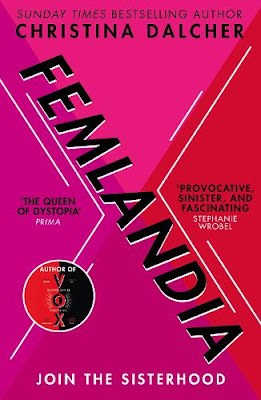Book #64
Miranda Reynolds always thought she would rather die than live in Femlandia. But that was before the country sank into total economic collapse and her husband walked out in the harshest, most permanent way, leaving her and her sixteen-year-old daughter with nothing. The streets are full of looting, robbing, and killing, and Miranda and Emma no longer have much choice—either starve and risk getting murdered, or find safety. And so they set off to Femlandia, the women-only colony Miranda’s mother, Win Somers, established decades ago.
Woah. Okay. I’ve had to let out a few measured breaths before starting to process this one.
The premise is exciting - a woman-only community living freely, separate from men. The founder’s daughter finds her way there as society breaks down on the outside. The adaptation to new rules, a new way of living. The promise from the book’s description that I was about to experience a women’s only ‘safe haven’. Sounds cool, sounds like something I would happily consume, hell, maybe I’d even consider launching my own commune. Right? Wrong. I had so many issues with this which I’ll relate to you, whilst attempting to keep the vitriol from my voice.
Firstly, the title and the name of the commune - Femlandia. FEMLANDIA. FEM! I don’t have the energy to go into all the issues I had with this, but I will say it gave me distinct memories of a revered 90s YA author who would have his characters go to the mall and visit shops called things like CD World.
Despite the fascinating dystopian idea Dalcher has here, she fails to make it in any way engaging. The plot is dry, peppered with memories which sometimes don’t feel relevant, or which are there to reinforce a point already made, as though readers are too stupid to have clicked onto it the first time. Our main character, Miranda, is unlikable as hell, and no one else fares any better in the popularity stakes, making it impossible to care what happens to anyone.
What I was really interested in here was how the community functioned in comparison to the outside. What are the rules and why have they been enforced? What are relationships like? It seemed there was very little democracy, with the women being ruled over by a leader, but there was no real exploration of this. If this is being depicted as a cult, I want to know more about it.
Which brings me on to my next point - portraying this whole community as a cult, and choosing to name their leader Jen Jones, is incredibly tasteless. I find it impossible to believe this is a coincidence, and I find it painfully unnecessary and cheap.
The whole thing smacked of transphobia to me. When our insipid protagonist reaches the gates, she questions the women-only rule, and specifically asks about trans women. She’s told trans women are too grey an area, and they deal with only absolutes. If they start letting trans women in just because they identify as women, then where will it stop? BIG YIKES. A disgusting statement, which happens in the first quarter of the novel, so I had my back up the rest of the way. Trans men are never mentioned, and seem not to exist in Dalcher’s world.
I’ve spent enough time talking about this, and I’d like to move on. In parting, I’d like to express my hope that the use of XX as a women-only symbol is removed from the marketing materials, as not all women have those chromosomes. It would also be lovely if we all started to think a little bit about other groups in society before thrusting something like this into the world.

